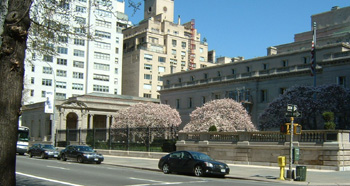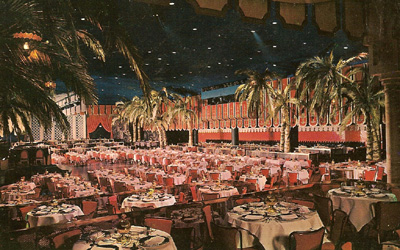For most of the morning, I felt so sluggish, and so comfortable
reading Dawn Powell and taking tea in bed (which sounds better than it was,
because I'm leaving out various organic irritations, but still), that I actually
considered canceling my appointment with the allergist. Happily, I made the
decision not to get back into bed at just the right moment, and I managed to
leave the apartment without forgetting anything. Second Avenue seemed to be
clogged, but the bus made its way to 70th Street in fine time. When the
appointment was over, I walked out onto 67th Street and headed east.

I considered dropping in at the dermatologist's, between Park
and Madison, to see if he could take a quick look at my fading rashes and decide
whether I ought to make an appointment. But dropping in isn't something that you
do in New York, for business or pleasure, or - outside of an emergency room -
for health care, either. And could I really imagine his saying, "No, I don't
need to see you right now. Let's wait and see." He probably wouldn't see me at
all. And I was enjoying the walk too much.
Sadly, it wasn't one of my hands' steadier days, but the bright
sunlight worked in my favor, at least with respect to architectural elements.
These pillars to the left were gleaming in the sun on 67th Street at Madison
Avenue. The Bradford pears were blooming. It was just too cold to go
without a coat. I was thinking about an entry that I want to write for the
Daily Blague, about geeks. Now, when I was in school, there were no handsome
geeks, or even ordinary-looking ones. Geeks were like that annoying kid in
War Games (played by Eddie Deezen, I believe). You got the idea that they'd
taken up science faute de mieux. Personal computers changed all that.
I was also thinking about a pseudonym that came in on a piece
of spam. I have a trash bin filled with messages from the likes of Altimeters H.
Quest and Pistils E. Vibration; there's something vaguely naughty about these
names that you can't always put your finger on, and the juxtapositions are
usually funny, although I suspect they're computer-generated. The name that
tickled me was different. It lacked the preposterous middle initial, and the
first name didn't begin with a capital letter. But it still makes me laugh, and
I can't bring myself to delete the spam. It's "pelvis Romano."

Walking up Fifth Avenue, I had the sense of being in the
country. The sidewalk is wildly uneven. It's actually made up of hexagons of
macadam, or some other relatively primitive paving material, and the profusion
of major tree roots snaking out from Central Park has wreaked havoc with much
of it. But the arch of trees rising overhead - I must look into what kind of
trees they are - are vastly taller than ordinary city trees (which have, I
understand, an average life-span of forty years), and I always feel that I'm on
a straight stretch of a country road. (Much as I love Central Park itself, the
walkways always seem far more contrived, as indeed they are.)
As I was carrying a smallish Tumi bag today, I was scooted past
the Met's security, but I would have checked everything if I'd had to, because I
was there for lunch. Starving. When I got to the basement cafeteria, the chef
was washing down one of the griddles, but it wasn't too late for a cheeseburger.
I don't know why I'm crazy about this place, because I don't like cafeterias
as a rule. During the consumption of my cheeseburger, I read a bit of an article in The New York Review about
fighting AIDS in Africa with at least one hand tied behind the back by
Evangelicals. To my mind, there is very little difference between denying some
people sex information and protection because it's "sinful," on the one hand,
and condemning others to gas chambers because they "pollute" society; I just
wonder how long it's going to take society at large to figure this out and
marginalize crazy religionistas.
Just beyond the cafeteria, in the basement of the Lehman wing,
there's a show of quattrocentro pictures arranged around the career of Fra
Carnevale, who painted a few good panels and a lot of indifferent ones. I walked right up to
Fra Lippo's St Lawrence, one of the few paintings on exhibit
that's really worth looking at. It happens to belong to the Metropolitan, but I
didn't know it before this show. As I was approaching it, I noticed that a woman
was approaching me tentatively. Peripherally, I didn't recognize her, and I
certainly wasn't expecting to run into a friend at the Met on a weekday
afternoon. But it was a friend indeed; years ago, our spouses were associates at
the same firm, and we have kept up ever since. For the next hour - or just under -
we stood here and there and talked. I must remember to look up flash memory
cards for her, and to send her the URL of the page on Miss Gostrey's Guide
that explains the difference between Web logs and Web sites. And of course
we have to make plans to get together. My friend has a ten year-old daughter who
has figured out how to access the Web, unsupervised, coasting on someone else's
WiFi signal. I warned her about
littleboy.
I had really dropped into the museum with no higher view than
lunch and a few pictures, so after my friend tore herself off to the gym, I took
the escalator up to the second floor and went to see a few friends in the old
masters galleries. Georges de la Tours's La Sorcière, Breughel's The
Harvesters, and even the odd picture that hangs right across the gallery
from The Harvesters,
Moses and Aaron Before Pharaoh:
An Allegrory of the Dinteville Family. One of the gentlemen in this latter
picture is more famous as half of Holbein's Ambassadors (the beau mec
on the left, I should think),
but there is a homoerotic spiciness to the Pharaoh picture (its background
and its composition) that sets it apart from almost everything else in its
enfilade. Finally, my doomed scientiest, Lavoisier. This man of science, whose
inheritance included the tax farm that funded his research, was guillotined in
1794, notwithstanding the fact that he had discovered, ahem, oxygen. I
don't know what happened to his widow, and I don't know what David felt about
this portrait at the time (1788, the year before). But even as a painting
it is one of the Met's masterpieces. We are so unbelievably lucky here. Thanks
to plutocrats like Morgan and lonely old retailers like Benjamin Altman and
impresarios like Duveen and a host of Met promoters of whom Philippe de
Montebello is simply the apogee, New York has a triumphant, feloniously gorgeous
collection of great European pictures. More about the Met vis-à-vis the
great European museums some other time - as if anybody who hasn't been to Italy
could write about such a thing.
Walking home was not pleasant. I had been up on my legs for
weeks, it seemed. I plodded on, but I wondered how on earth I would find the
fortitude to get up and go out again in the evening. We had tickets to see
Moonlight & Magnolia, a truly hilarious show about the making of Gone
With The Wind. And I did go. Kathleen's laughter was joy itself. David
Rasche ought to have mentioned The Big Tease in his credits, because we
always think of him as "Stig."

If my hand were steadier, you could count the budding blooms in the Frick's garden.





